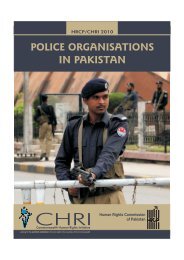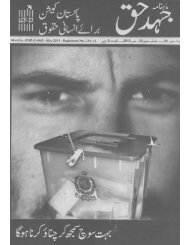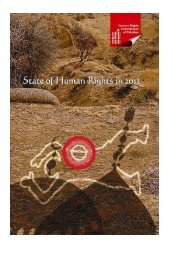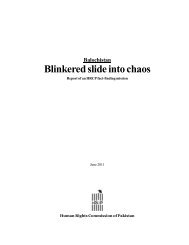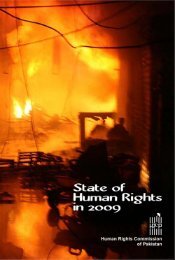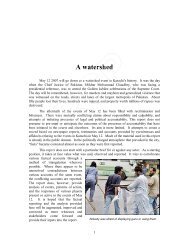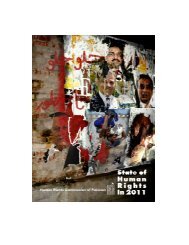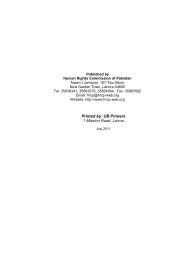Download PDF file - Human Rights Commission of Pakistan
Download PDF file - Human Rights Commission of Pakistan
Download PDF file - Human Rights Commission of Pakistan
- No tags were found...
You also want an ePaper? Increase the reach of your titles
YUMPU automatically turns print PDFs into web optimized ePapers that Google loves.
134Revisiting Police LawsA code <strong>of</strong> ethics at the police stations is missing while accountability mechanisms continue to reside with theprovincial government. This allows for many malpractices to be ignored.Mr. Khosa informed the participants that the Provincial Public Safety <strong>Commission</strong> (PPSC) <strong>of</strong> Punjab has notmet for the past 5 years, meaning a code <strong>of</strong> conduct could not be established. The PPSC was supposed to depoliticizethe police. Unless the institutions created by the Order are implemented, reforms will not take place.Mrs. Sarkar Abbas, formerly a member <strong>of</strong> DPSC and currently a member <strong>of</strong> the NPSC highlighted thepowerlessness <strong>of</strong> PSCs and described her experience about 600 complaints received from the public regarding therefusal <strong>of</strong> the police in registering FIRs. In discussions with the DPO regarding the issue, Mrs. Abbas realised that asignificant problem was that the DPSC has no binding force in law to hold the DPOs accountable. When the DPSCsent reports to the DPO, the DPO was not bound to implement the orders. Interestingly enough, some <strong>of</strong>ficers at thelocal level do not even have knowledge <strong>of</strong> the existence <strong>of</strong> a NPSC. This shows that at the provincial level, theinstitutions that the Order created are not given much weight by the government or the police.Later on during the discussion Mr. Mukhtar Ahmed Ali said that there is an undue general sense <strong>of</strong>‘powerlessness’ among our representatives and highly placed <strong>of</strong>ficials. If the power vested in their position is ‘s<strong>of</strong>t’and does not entail the power such as to suspend or transfer or be able to get people transferred. He wondered whyshould a committee like PPSC or NPSC feel or be seen as powerless when it had the Home/Interior Minister as itsChairperson. In his view, there is a big vacuum <strong>of</strong> capacity and competence and a lack <strong>of</strong> sense <strong>of</strong> responsibility tomake a difference on part <strong>of</strong> individuals where they actually can. He referred to the overseeing power <strong>of</strong> the PSCsregarding implementation <strong>of</strong> the Policing Plans. He thought that the members <strong>of</strong> the <strong>Commission</strong>s could make adifference by involving themselves in the matter and force the police to implement plans as well as involve themselvesin identifying procedural flaws and systemic issues rather than getting bogged down in bureaucratic bickering.At this juncture Sanjay Patil drew attention towards the functions <strong>of</strong> the PSCs, e.g. the NPSC’s functionsincludes submission annual report to parliament. He wondered if that was being done. To this Mr. Khosa informed theparticipants that NPSC was submitting the report. Mr. Mukhtar said that annual reports and policing plans are thekind <strong>of</strong> instruments which the NPSC needs to pick up, pursue and debate openly how police plans and how far thetargets set have been achieved at the end <strong>of</strong> the year. By identifying systemic issues and flaws in policing can makea critical contribution, however it seemed to him that these were precisely the areas where hard work was missing.Mukhtar Ahmed Ali pointed out some substantive issues created by the 2004 amendments to the Order. Hepointed out that the amended formula <strong>of</strong> composition <strong>of</strong> PSCs is a major area <strong>of</strong> concern. It was much better in theoriginal scheme. For instance, the amended formula prescribes for inclusion <strong>of</strong> opposition members at various levels.It is however quite possible that there may be no opposition at district level; the new scheme does not envisage sucha situation. Similarly, in the PPSC case, there can be a situation where the opposition is so disproportionately representedin the provincial assembly which may cause hurdles in the independent working <strong>of</strong> PSC. He also referred to themerger <strong>of</strong> PSCs and Complaints Authority, which according to the original scheme were to be independent institutions,as a great blow; control <strong>of</strong> SHO over investigations etc. a step backwards. Another point raised in this respect wasthe recommendatory role <strong>of</strong> PSC as they can’t compel the police to act on their findings and recommendations. Theparticipants wondered what use were the commissions in such a case.A related issue was later highlighted by Mr. I. A. Rehman who was <strong>of</strong> the opinion that a rather inexpensiveand accessible accountability mechanism was provided under the Police Act, 1861 as the district magistrate acted asa barrier to the police excesses, which was removed by the Police Order, 2002 without providing an effective andefficient alternative. He expressed his disagreement with the way the commissions and committees are required to becomposed and work. He thought civil society organisations such as trade unions, need to be involved more in thefunctioning <strong>of</strong> PSC Speaking from his experience and observation <strong>of</strong> Bonded Labour System (Abolition) Act underwhich Vigilance Committees have been formed in which each member could initiate proceeding, he was <strong>of</strong> theopinion that every member should be so empowered that he/she in her own capacity can take effective steps toredress public complaints only this way can the reform process taken further. He agreed with Mr. Khosa that the



